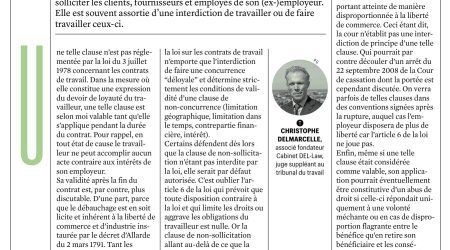Smart kilometric tax in Brussels, should the employer pay if it was to be implemented?
Posted the 11 December 2020Many workers employed by Brussels companies come from Flanders or Wallonia. It must be said that the real estate and expensive rents in Brussels will have pushed some of them further and further away.
And given the many shortcomings in public transport services, many of them come by car.
These forced commuters could tomorrow (2022) in all likelihood be subject to the smart kilometric tax that Brussels has just announced.
The question for them will be whether their employer should pay for this significant additional cost.
A distinction can be made according to whether the employee uses his own vehicle or a company car.
In the case of the use of a company car, although the question is not decided, it seems that the leasers will have to pay the intelligent kilometric tax. And, in this case, it seems clear that, as far as possible, they will pass the burden on to their customers; the companies. In their turn, the latter might want to require the worker to pay the extra cost at least for his purely private trips to Brussels. Otherwise, one might wonder whether - as I maintain - the flat-rate tax advantage for the use of a company car for personal purposes (art. 36 CIR 92) also covers the indirect assumption by the employer of the kilometric tax linked to purely private trips to Brussels or whether a separate advantage should be counted. This without even measuring the impact of privacy on this issue as more globally in the assessment of the tax.
In case of use of one's private car, for purely professional trips (visits to clients, etc.), a priori the related mileage tax would be paid via an expense account or a mileage allowance according to the conditions of the employer's expense policy, including possibly the use of public transport with priority over the car. This will further increase the administration related to the reimbursement of expenses.
For home-workplace travel by car, unless special arrangements have been made with the employer concerning the payment of home-workplace travel expenses, the employee will have to bear this additional cost alone. Indeed, the home-workplace commute is in principle a private expense to be borne by the employee.
This being said, it is to be expected, especially in large companies, that there will be significant pressure from trade unions to make a gesture and to take at least part of the additional cost. Especially since to remain competitive in terms of recruitment, the employer must quickly ensure that its offer remains attractive to the employee by considering the practice of other Brussels employers as well as the location of the candidate.
A gross allowance will obviously be extremely expensive for the employer, with a gross doubling of the cost at the very least. No doubt other possibilities could be considered, such as a lump-sum compensation for travel expenses or a mileage allowance. For example, provision could be made for the additional cost imposed by the professional presence in Brussels compared to other regions. This could make it possible to justify a net reimbursement at least in proportion to the professional share of travel to Brussels.
As we can see, unless they relocate their headquarters, Brussels employers will probably be the ones who will ultimately indirectly pay part of this smart kilometric tax. This additional financial cost, combined with the aggravated mobility problems in Brussels, will certainly incite many to consider leaving Brussels.
For those workers who would not be able to obtain a reimbursement and insofar as the kilometric tax would be linked to trips in order to acquire or obtain professional income, one could try to defend a deductibility as real professional expenses - thus without application of the flat rate - in the IPP declaration. Provided that it is accepted that the lump-sum mileage allowance of 0.15 euro/km provided for in article 66§4 of the CIR 1992 does not cover this new tax - as it does not cover financing and mobile phone costs. This would at least partially weigh the weight of a favorable measure to the Brussels budget on the federal budget. However, if one were to consider that the lump sum of 0.15 euro/km also covers this tax, the worker whose employer would not intervene would be the only one to bear this new tax.
Related articles

Caution if a former colleague opposed to your employer asks you to testify in their favor

Social TV Show #1 | The Flexibility of Remuneration and Salary Transparency
